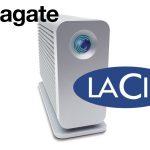Seagate begins its next big takeover: LaCie

American storage company Seagate announced on Wednesday its intention to become majority owner of French storage company LaCie by buying 64.5% of the company's shares from chairman and CEO Phillippe Spruch. Pending government approval of this transaction, Seagate will then buy up the rest of the outstanding stock in cash or commence a squeeze out maneuver of any minority stakeholders.
After he sells his stake, Spruch will become the head of Seagate's consumer storage products organization, above Patrick Connolly, who is currently Seagate's vice president and general manager of retail. Deputy general manager of LaCie Pierre van der Elst will also join the Seagate team. The financial terms of the new position for LaCie's CEO have not yet been determined.
Larry Page: 'Motorola is a great American tech company'

Googorola is now a reality. Today, Google formally completed its Motorola acquisition, after completing the final hurdle, approval from China, over the weekend. The approval came with conditions -- that Google keep Android open for at least 5 years -- but the company had been on that track anyway.
Motorola is a big purchase, $12.5 billion, initiated in August 2011. With Motorola, Google gets an enormous cache of patents -- pending and approved around 24,000; enormous wealth in cellular research and development, manufacturing operations; and a heap load of headaches. Over the weekend, for example, International Trade Commission blocked entry to a majority of Motorola mobile products for violating a single Microsoft patent.
Facebook acquires mega-popular Instagram for a cool Billion

Just days after making its big arrival on the Android platform, popular photo-filtering social network Instagram will be acquired by leading social network Facebook.
The acquisition will give San Francisco-based Instagram approximately $1 billion in cash and shares of Facebook. The deal will close later this quarter.
SalesCrunch to Cisco: We'll acquire WebEx, if you pay us

Today, SalesCrunch publicly disclosed its unsolicited -- what some would call outrageous, low-ball -- offer for WebEx. The online communications platform startup would pay Cisco Systems one dollar plus a 15-percent stake. Essentially, SalesCrunch offers nothing for WebEx, and really asks the tech giant to pay for the privilege of unloading the online-collaboration suite.
Cisco acquired WebEx for $3.2 billion in 2007. A single dollar might as well be nothing. But it's more than that. SalesCrunch wants WebEx assets to build out its own platform, and, of course, the customers. Cisco's involvement could instill confidence, and the bold play for WebEx demonstrate SalesCrunch's hunger to succeed by thinking outside the box. The 15-percent stake could assist the startup winning new rounds of funding or enticing new investors -- hence the concept asking the communications giant to pay SalesCrunch to take on the business.
Googolora receives critical regulatory approval

Amid rumors the US Justice Department will approve Google's merger with Motorola Mobility this week, the European Union's Competition Commission acted first, clearing the deal.
In a procedural move, the European Commission halted merger review in mid December, after requesting additional information. Today's approval puts Googolora (not any official name, of course) within view. Merger now seems all but inevitable.
Is Microsoft preparing another Yahoo bid?

The stage is set for an eventful holiday season at Yahoo. Sources close to the struggling Sunnyvale, Calif. search company tell the New York Times that Microsoft has signed a non-disclosure agreement which allows it to look into the media giant's books. The Redmond, Wash.-based company joins Silver Lake, TPG Capital and several others as potential suitors.
Talk of a Yahoo sale has increased since September, when a memo from former CEO Jerry Yang leaked to the press. "Our advisers are working with us to develop ideas that we will pursue proactively. At the same time, they are fielding inquiries from multiple parties that have already expressed interest in a number of potential options", the note reads.
eBay buys Hunch to better guess what you will buy

In an effort the provide better personalized recommendations, eBay has acquired privately-held Hunch, a two-year-old service that suggests content on the Internet based on personal tastes. The auction service expects Hunch to integrate into a variety of its offerings beyond recommendations.
Hunch founder Chris Dixon will lead eBay's existing recommendations team, reports indicate. "We’ll be tackling all kinds of interesting challenges as part of eBay including predictive merchandising, interpreting unstructured data and creating merchant insights", he writes in a blog post announcing the acquisition. "We can’t wait to get started".
Kodak sells off its CCD image sensor business to private equity firm

The Eastman Kodak Company on Monday announced that it has sold its Image Sensor Solutions (ISS) business to Beverly Hills private equity firm Platinum Equity for an undisclosed sum. The transaction includes the sale of Kodak's New York research and manufacturing facility where solutions for commercial, industrial and professional imaging are developed.
Kodak's ISS business manufactures mostly CCD (Charge-Coupled Device) sensors; a type of digital image sensor that has gradually been losing market share to CMOS (Complementary Metal Oxide Semiconductor) sensors, the smaller, more energy-efficient image sensors commonly used in mobile phones and consumer digital cameras.
Recent Headlines
BetaNews, your source for breaking tech news, reviews, and in-depth reporting since 1998.
Regional iGaming Content
© 1998-2025 BetaNews, Inc. All Rights Reserved. About Us - Privacy Policy - Cookie Policy - Sitemap.